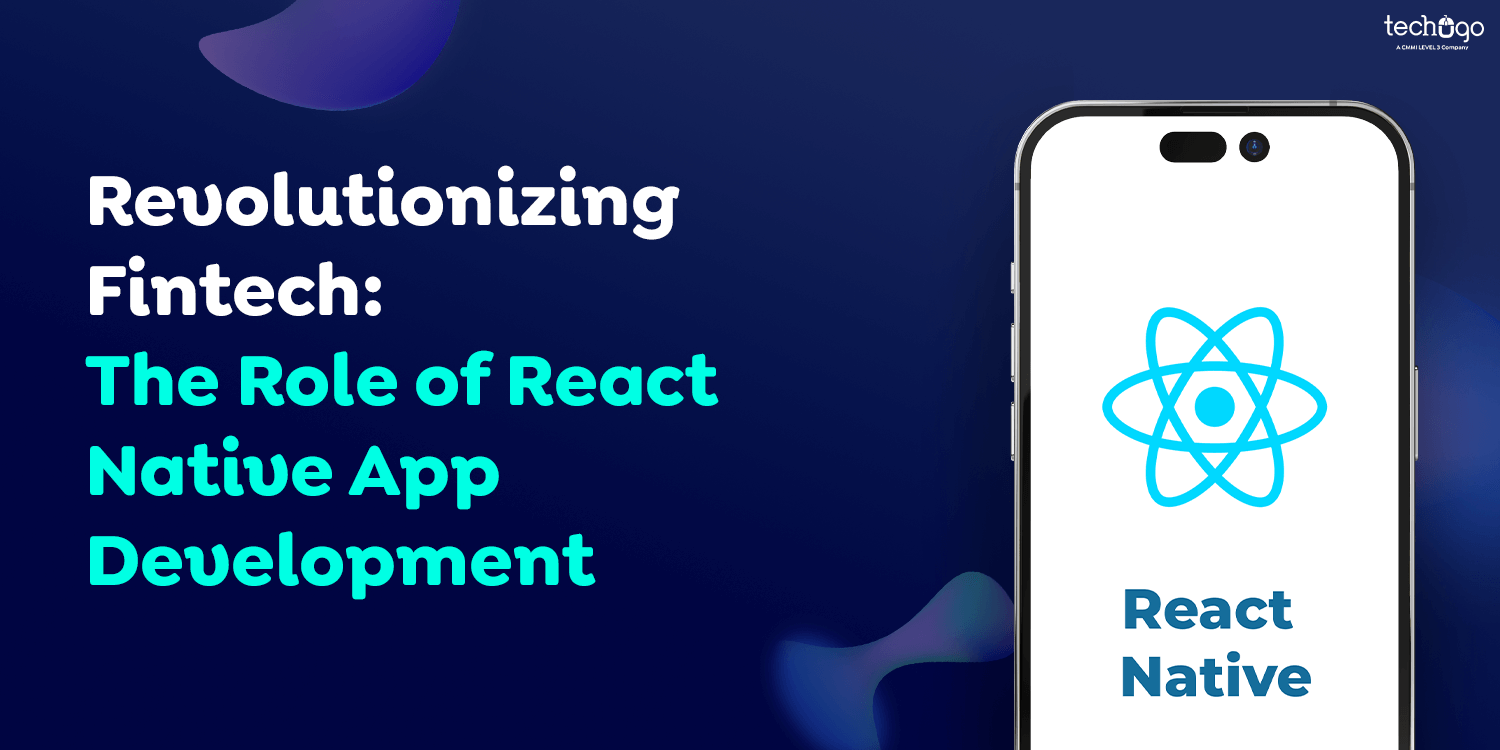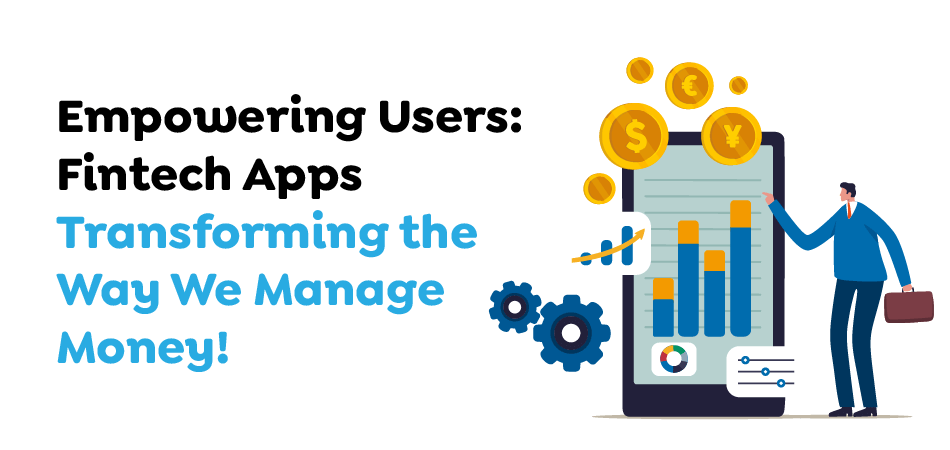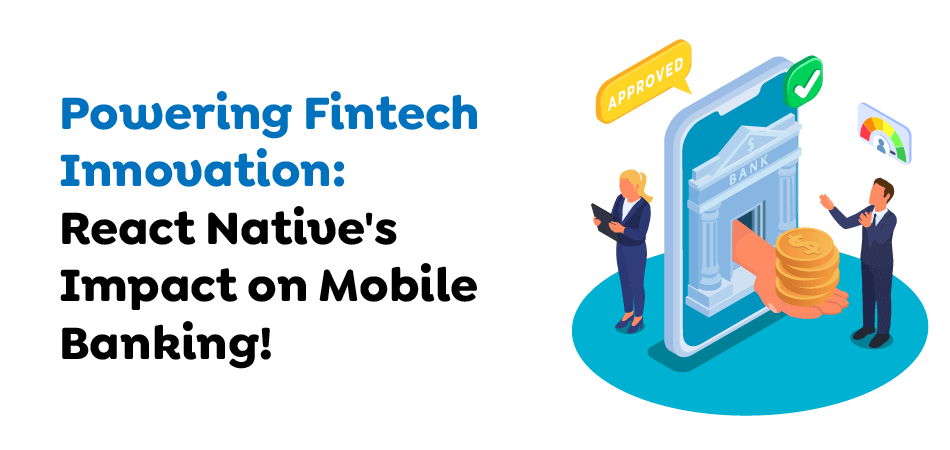7 Aug 2024
Updated on January 30th, 2025
Revolutionizing Fintech: The Role of React Native App Development
Matthew Connor

Fintech is always associated with complicated technology and protocols that challenge users; however, technology is changing that today. This new technology has brought unprecedented convenience, speed, efficiency, and speed in financial transactions, making life much easier for businesses and consumers. As Fintech expands and flourishes in the constantly changing digital landscape, the demand for user-friendly, practical mobile applications becomes more urgent.
Fintech apps build with the support of a React Native app development company are one great thing that has emerged from this harmony. They have literally saved the entire world from problems and confusion by making daily banking transactions simple, fast, and safe. Businesses and the general public are thrilled by the use of apps since they can cut down on time and eliminate the need to be physically present when making payments.
React Native is one of Fintech’s most sophisticated mobile app development tools. It’s a potent tool developers can use to build mobile apps that are swift, fluid, responsive, and smooth. In this blog, we’ll look at ways React Native reinforces the success of fintech-based mobile apps. Let’s begin.
What is React Native?

Facebook introduced React Native in 2005, quickly becoming one of the top frameworks to develop mobile apps. React is a front-end JavaScript library, which can be a reason for its many advantages.
In light of the wide variety of operating systems and devices, making applications is challenging. That’s why React Native is to your rescue. It removes the necessity of creating separate code for iOS and Android applications. The development of applications using this framework will hugely save time and money.
Because fintech-related applications are typically slightly more complicated than others, looking for React Native app development company would be an intelligent choice. Apart from its single code base, there’s plenty of additional React Native has to offer.
Also Read : Stay Ahead of the Curve: 8 Effective Ways to Protect Your Fintech App
The Rise Of Fintech Apps

Fintech applications are specially designed software that can simplify the entire Fintech Software Services and bring the automation of these services as innovative. Therefore, these applications are designed for the finance industry, which blends technology and finance. They will further increase the availability of financial services while also rivaling traditional banking services.
Fintech software developed by a React Native app development company is designed to provide an easier and faster way to control and implement financial services. Nowadays, it is easy to outsource Fintech technology development to your business.
There are numerous advantages of using fintech-based applications instead of traditional ones. The list of advantages includes:
Accessibility: Fintech apps built by a React Native app development company do not require a complicated platform for every process. It’s, therefore, just enough that users have an interest connection and register to use all financial services.
Reduced costs: Fintech apps are digital services that do not require brick-and-mortar purchases. Therefore, Fintech App Development can help customers pay lower fees than traditional banks.
Better financial management: These apps created by a React Native app development company permit users to manage their finances on handheld devices. Thus, one could reduce a considerable amount of time while facilitating faster transactions, whether it’s the payment or approval.
Wide Range of Solutions Available: Fintech-specific applications can provide a wide variety of services, ranging from online payment to investing. Additionally, one can expect financial guidance on the internet. Many times, an application will contain multiple services that will help finish all of the tasks using one application.
Ability to Personalize: Fintech aids applications in collecting user data. This data allows the application to offer personalized services to enable users to achieve their financial goals.
Also Read : How AI is going to transform Fintech in Canada
Advantages Fintech’s Mobile Applications Created using React Native

Big companies like Facebook, Instagram, and Airbnb have already adopted this technology to aid in their app development processes. RN is still one of the frameworks attracting more developers and businesses. Why is React Native so appealing to all fintech enthusiasts?
Cost-effectiveness
React Native lets a React Native app development company to develop mobile apps with JavaScript. With its reused components and pre-built libraries, it can also significantly cut down the time and overall costs of developing an application for mobile devices. An analysis found React Native to be a great choice. React Native can reduce development costs by 30 to 50 percent.
Faster Development Time
As previously mentioned, React Native’s reusable components allows a React Native app development company to build mobile apps more quickly than traditional app creation techniques. Furthermore, React Native provides a hot reloading feature that will enable developers to monitor changes to the application in real-time and improve development speed.
Cross-Platform Compatibility
Fintech companies must connect with customers across multiple platforms to expand their client base. React Native lets developers develop apps that operate seamlessly across iOS and Android devices without compromising on quality or performance. With its cross-platform support, Fintech firms can improve their image as a brand and increase customer trust through collaboration with fintech app development company.
Rich Ecosystem and Community Support
Solid community support and a flourishing community are the advantages of React Native. To speed up the development process, an extensive library of pre-built components, resources, and tools can be accessed. The wide network of support is an enormous benefit for finance applications that typically require intricate functionalities and integrations.
Faster and Affordable App Development
As we mentioned before, React Native requires fewer resources and less time to write code. Therefore, it is an easier and cheaper tool to create solid fintech apps. React Native is generally more user-friendly. It also comes with numerous ready-to-use components that significantly improve development speed.
Instead of hiring separate developers or teams to develop iOS and Android applications, we have to find a React Native app developer. This is definitely a cost-effective solution for fintech applications if you have a budget.
Easy UI Modifications and Relocation
If fintech apps are built with React Native, they can take advantage of the main benefit of hot loading. This feature lets you implement the most current versions and changes to the UI without stopping the application from running. Furthermore, the transfer of Web developers into using the React Native environment is easy because it’s all Javascript as well as other elements and API.
Productive Framework
With its intriguing features and tools, React Native allows the development of live applications that can keep up with native-like performance. It is bundled with the most effective design and debugging tools and extensions for Chrome and Firefox browsers. Additionally, it comes with the React Developer Tool, which smoothens coding to a significant degree. Developers can check the hierarchy of components within the React platform and keep track of the components’ parents and the status of their components.
Easy Data Migration
Transferring data from outdated technology and applications typically creates numerous challenges. However, with React Native, data migration is easier and more secure. To ensure this is completed correctly in your application, discuss the issue with React Native or the React Native development agency you decide to work with.
Improved User Experience
Fintech companies depend on providing users with a smooth and effortless experience to earn and keep their confidence. React Native’s capability to offer an easy and flexible user interface (UI) is among its main selling points.
The framework lets developers create apps using the same codebase, which can be utilized across various platforms, resulting in the same user experience. Furthermore, React Native’s animated and gesture-based UI components produce high-quality, visually appealing apps that draw and keep their users.
Popular Framework With a Growing Community
In the past few years, the React area has grown in recognition among developers. There’s an ever-growing community that implies plenty of support should your team of developers get stuck. So you’ll be able to discover a solution to the issue you’re facing. Even if you face challenges, however, developers can find a path to get around these. This dramatically improves the way fintech apps will be through React Native.
Ways React Native Reinforces the Success of Fintech Mobile Apps

Fintech, the area of technology and finance, requires high security and efficiency. React Native checks both boxes. It is only by partnering with a reliable React Native app development company can help ensure the popularity of Fintech mobile applications in the following ways:
Top-notch Security Measures
A study has revealed that React Native ranks fifth among professional developers, with 16.48 percent. It offers enhanced safety and security, making it crucial for transactions involving sensitive financial data. It works with third-party libraries, which provide high-quality security for data encryption and authentication features. React Native’s structure also blocks malicious attacks like SQL injections and shields users’ data from unauthorized access.
Customizable Dashboards and Analytics
Mobile apps developed for Fintech typically need to provide users with an overview of their transactions, accounts, and other financial data. React Native lets developers modify dashboard layouts and other analytical tools to present data clearly and concisely. Developers can use different APIs to access and manipulate data accessed via the application.
User-Friendly Interfaces
The app’s success in Fintech is based on user-friendliness and response speed. React Native offers a constant user experience across various mobile and desktop platforms. It enables users to navigate the app effortlessly, and the user interface is easy to use, increasing user engagement and app transactions.
Real-Time Data Synchronization
In financial technology, synchronizing data in real-time is crucial. React Native enables the evolution of mobile apps that keep track of transactions and economic data in real-time. This reduces the risk of data loss or mistakes. Applications developed with React Native will automatically synchronize data, ensuring users have up-to-date information when required.
Scalability
As fintech companies expand, their mobile apps must develop to meet the demands of their clients. React Native allows developers to improve app performance to handle increasing transactions and traffic without crashing or experiencing significant performance problems, which is crucial when fintech companies expand their offerings.
Challenges of React Native for Fintech Apps

Despite its numerous advantages, React Native has a few negatives and issues. There is no perfect solution; every aspect has its own pros and cons. Since we’re discussing everything related to React Native in Fintech, it is important to discuss the negatives associated with React Native.
Security Concerns
Fintech apps handle sensitive financial information, which makes security a top concern. Even though React Native offers several security features, ensuring it meets industry standards and implements strong security measures requires meticulous planning and experience.
Performance Overhead
While React Native performs admirably in many situations, there are occasions when native development can provide better performance, especially when it comes to features that require a lot of resources. It is crucial to consider the needs of your Fintech application to decide whether React Native is the best option for you.
Complex Integrations
Fintech applications often require integration with a variety of third-party services and APIs. Even though React Native supports many integrations, some might require custom native modules, which could complicate developing processes.
Tips for Hiring Reactjs Developers
Ten things to be aware of when hiring Reactjs developers
Knowledge Of Mobile Design Patterns
If you are hiring a ReactJS mobile app development company in Canada, you must ensure they understand the different mobile design patterns.
Mobile apps have their own rules regarding design and user interface. Your candidate should be aware of how to use them.
They must be able to create interfaces that meet users’ needs and are adapted to their particular devices.
Additionally, they must understand the importance of making things easy and simple when designing for mobile devices.
Expertise With All ReactJS Libraries
Hiring a ReactJS application developer with vast experience in the development of web-based applications utilizing both the JavaScript and ReactJS libraries is crucial.
The candidate should be familiar with React component life cycles, which include components. DidMount and render, as well as when the component will be removed from the mount.
In addition, they need to demonstrate they know and understand Flux and Redux frameworks.
Additionally, they must have experience in using them to coordinate the flow of data and state at the front end.
Able To Develop Responsive App
A reputable ReactJS application developer crafts responsive applications that respond dynamically according to the size and orientation of the device used by the user.
They must also know the best practices for mobile-specific design, including avoiding unnecessary scrolling, limiting the use of input fields, and ensuring UI elements are easily observed and interacted with regardless of screen size.
Experience In Developing Cross-Platform Apps
Making mobile apps using React Native requires specific abilities that a ReactJS developer might or may not possess. Look for a developer with knowledge of React Native development.
It allows programmers to create programs that always work with Apple’s iOS and Google’s Android operating systems. In addition, they must be aware of the differences between React on the Web and React Native.
Two strategies let them identify what time and date it is practical to utilize among the various social networks.
Familiarity With Mobile App Testing Strategies
When developing apps using ReactJS, developers who are involved in the development of mobile apps must be aware that speed and performance are essential for mobile applications.
This is why they should be aware of regular tests and debugging techniques, such as profilers and unit tests for the application.
In addition, they should be aware of optimization, the tenets of reducing resource consumption and identifying dead code, and the usage of tools like webpack/bundle phobia to limit the size of the bundle.
Define Your Ideal Profile For A Developer
Establishing your ideal remote-only ReactJS Mobile App Developer persona profile can help you begin the recruitment process.
According to the requirements and duties for this job, what kind of skills are essential to have? What are the questions to ask to determine this? When you know what qualities you’re looking to find in candidates, you can make a successful advertisement and eliminate unsuitable candidates quickly.
If you’ve written down your profile, you’ll ensure that you don’t hire an individual who is unsure what to do with food items on the stovetop or in the oven.
Source Candidates Through Platforms
After determining the abilities and characteristics of the candidate you expect to excel in the mobile ReactJS App Developer position, the next step is hiring the right people.
You’re probably aware of several ways to locate suitable candidates, such as word of mouth, learning about the opportunities provided through LinkedIn’s recruitment solutions, or posting open positions on other platforms for freelancers.
Don’t limit yourself to job sites that attract all kinds of candidates. Instead, look for niche websites that cater to applicants who have previous experience using ReactJS (or other development platforms).
There are many chances to meet great individuals and increase the possibilities for work.
During The Interview Process, Make The Right Inquiries
In evaluating the candidate’s personality, you should also pay attention to the person you are interviewing. If you plan to interview developers advanced with reactJS, it could take a while, which means you need to be sure that the interview is appropriate.
During an interview, the interviewer should focus on asking questions so that he or they can relate the various requirements to a real-world scenario or a real-world issue.
Find out how developers can interact with data scientists, designers, and coworkers.
It will help you imagine how this candidate might contribute to the success of c
Confirm Technical Skills And Check References
This is a crucial point since a developer’s choice is essential. Ask the candidate to walk you through a complete ReactJS development project presented by the candidate. Then, ask them to show you what they think during the process and what they do with the code.
Once you have a better view of this aspect of development experience, consider other technical aspects, such as whether the applicant is proficient in certain programming languages and debugging techniques.
Select A Compatible Developer For Your Project
When evaluating ReactJS developers of mobile apps, it’s essential to decide if they are suitable for your team and project. The ability to be flexible, committed, and communicative are the primary factors to consider in the initial interview.
These qualities can make it easier for the developers and you to get along. It is also important to examine their resumes and better understand their code style. In the end, you should ask them questions about their experiences to better understand the possibility of a lasting working relationship.
Future of Fintech Super Apps
The potential for super apps based on Fintech built by a React Native app development company in the near future is promising, but they also come with unique problems. Here are a few key things to take into consideration:
Increasing Complexity
Financial institutions are using customer data to better understand their customers. The data is utilized to create new ways of service and expand the customer’s relationship. That means instead of offering an opportunity to store money or obtain a loan, these institutions want to provide a broader range of services that are adjusted to each client’s specific requirements.
Growing Market
This market is growing quickly. The 2022 market was just $61 billion, but it is expected to grow to $426 billion by 2030. This indicates that there’s an enormous demand for these kinds of applications, and the market will only increase in the near future.
The future of super-fintech apps for Fintech is brimming with potential. However, it also has its own set of challenges.
AI and Personalization
The next step in developing mobile wallets is creating AI-powered super wallets and financial assistants. These assistants will give users a personalized experience and can automate budgeting tasks. Users can, therefore, receive guidance and suggestions tailored to their specific financial needs and automate a large portion of their financial management chores, making the management of their finances much easier.
Regulatory Challenges
Super apps offer a wide array of services combined into one application. However, they pose a number of regulatory problems in the fintech sector. Regulators must ensure that apps comply with laws and regulations and do not use their position to favor customers or the market.
Potential for Consolidation
The variety of services provided by these apps can result in a dispersion of services. This could be detrimental to customer satisfaction and make it difficult for users to use and navigate. This is why it could be necessary to integrate the services into an efficient, multi-functional super app.
Competition
Various fintech players, including SoFi, Venmo, MoneyLion, Block, M1 Finance, and Revolut, are developing the future of wallets. They offer user-friendly mobile-friendly apps that are vying to be customers’ most popular money management applications. Furthermore, technology giants like PayPal and Apple are also joining the race, looking to tap into their vast users and technical expertise to gain a significant share of the market.
Fintechs and tech giants like PayPal are forming the wallet’s future while fighting for market share.
In essence, futuristic fintech apps developed by a React Native app development company look promising; however, they face significant challenges. A successful business in this field will be dependent on user-centric designs, robust security measures, adhering to rules and regulations, and responsible data management.
Conclusion
It is essential to find experienced React Native app development company like Techugo to ensure successful mobile app development. The ten points above will improve your chances of finding the ideal candidate to meet your needs.
Be sure to define your requirements, conduct research, and assess them. Before deciding, thoroughly study the experience and portfolio of potential candidates.
Alongside technical abilities, you should consider the ability to communicate, problem-solving skills, and the capacity to work as a team. You should also evaluate a React Native app development company technical abilities and experience with developing mobile apps. These steps will ensure you select a competent ReactJS application developer who will help you achieve overall success for your app.
Get in touch with Techugo to build your React Native app for the fintech industry!
Get In touch
We are excited to here from you and let’s start something special Together. Call Us for any inquiry.
Write us
sales@techugo.caJust a call away
About you




